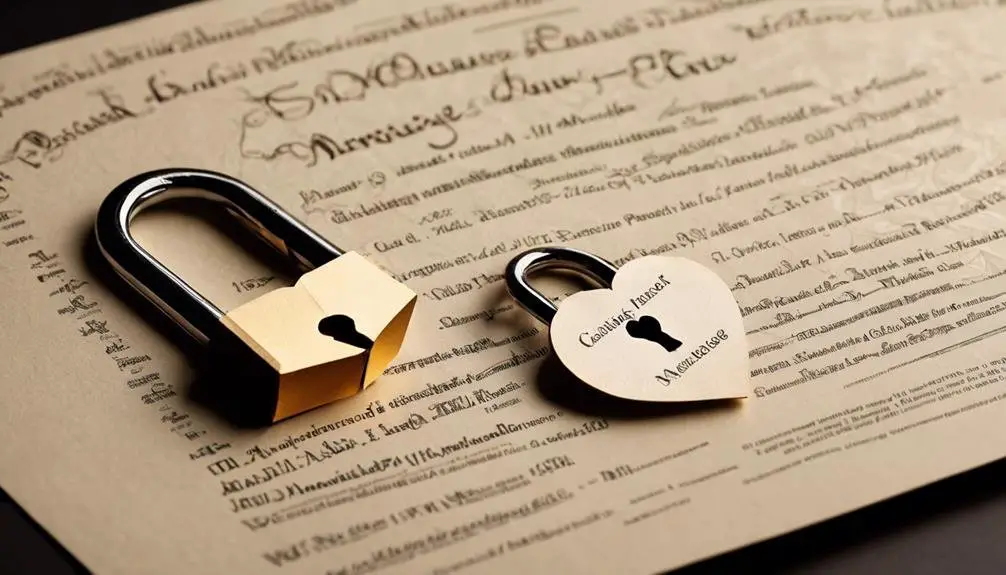The pros of a confidential marriage license are enhanced privacy for public figures, protection against personal safety threats, and minimized digital footprint. It prevents unauthorized access to marital status and personal details, crucial for those valuing confidentiality and security.
The cons of a confidential marriage license are its limited availability, only offered in places like California, and the required cohabitation at application. Additionally, obtaining copies becomes challenging, and unforeseen legal complications may arise, hindering some processes.
Takeaways:
- Confidential marriage licenses prioritize privacy, shielding wedding details and personal information from public access.
- Couples must navigate jurisdictional differences and legal requirements, emphasizing the importance of understanding local laws.
- Privacy concerns and limited recognition across states introduce complexities, especially in divorce proceedings and financial transactions.
- Financial implications, such as asset division and spousal support, remain governed by California’s laws, unaffected by the marriage’s confidentiality.
| Pros of Confidential Marriage License | Cons of Confidential Marriage License |
|---|---|
| Enhanced Privacy | Restricted Availability |
| Security Against Identity Theft | Access Difficulties |
| Protection for Sensitive Situations | Potential Legal Complexities |
| Minimizes Unwanted Solicitations | Co-habitation Requirement |
| Ease of Mind for Public Figures | Limited Legal Recognition |
| No Need for Publication of Banns | Difficulty in Legal Proceedings |
| Simplified Record Keeping | Complications in Emergency Situations |
| Enhanced Control Over Personal Info | Challenges in Estate Planning |
| Beneficial for Professional Reasons | Obstacles in Benefits Claims |
| Avoidance of Social Pressure | Potential for Misuse |
Pros of Confidential Marriage License
- Enhanced Privacy: Confidential marriage licenses ensure a high level of privacy for couples, keeping their marital status and personal information away from the public eye. This is particularly beneficial for celebrities, politicians, or anyone who values their privacy, as it helps them maintain a level of anonymity about their personal life. The confidentiality aspect safeguards against unwanted attention or scrutiny from the media or public.
- Security Against Identity Theft: By not making marriage records public, confidential marriage licenses can protect individuals from identity theft. Public marriage records can sometimes be used by criminals to gather personal information, but a confidential license keeps such details secure. This added layer of security is crucial in an age where personal data can easily be misused.
- Protection for Sensitive Situations: For individuals escaping abusive relationships or those with sensitive careers (such as undercover law enforcement), a confidential marriage license offers a layer of protection. It prevents abusive partners from easily tracking them down or jeopardizes their safety and mission, respectively, by keeping their new marital status hidden.
- Minimizes Unwanted Solicitations: Public marriage records are often used by marketers and solicitors to target newly married couples with various offers and advertisements. A confidential marriage license prevents such unsolicited contact, allowing couples to enjoy their new life without the bombardment of marketing materials.
- Ease of Mind for Public Figures: Public figures who wish to keep their personal life separate from their professional one find confidential marriage licenses particularly appealing. It allows them to marry without the event becoming a public spectacle, thus maintaining a clear boundary between their personal and public personas.
- No Need for Publication of Banns: In jurisdictions where couples are required to announce their intention to marry (publication of banns), a confidential marriage license circumvents this requirement. This can be a significant advantage for those seeking a quick, private marriage without the wait or public notice period.
- Simplified Record Keeping: For couples concerned about the complexity of public records, a confidential marriage license simplifies matters by keeping the record accessible only to them and certain authorities. This can make personal record keeping more straightforward and less worrisome regarding potential public access.
- Enhanced Control Over Personal Information: Couples have more control over who can access their marital status and personal details with a confidential marriage license. This control is particularly valued in an era where personal information is often freely accessible and shared.
- Beneficial for Professional Reasons: Professionals who may face discrimination or bias due to their marital status find confidential marriage licenses advantageous. It allows them to keep their personal life private, avoiding potential professional repercussions.
- Avoidance of Social Pressure: Couples who prefer a simple, private ceremony without the expectation or pressure of a large wedding find confidential marriage licenses ideal. It enables them to marry on their terms, free from societal expectations or pressures.
Cons of Confidential Marriage License
- Restricted Availability: Confidential marriage licenses are not available in all locations, limiting the option for many couples who might benefit from such privacy. This can be a significant drawback for those outside of areas like California, where such licenses are offered, forcing them to seek alternatives or forego the benefits entirely.
- Access Difficulties: Obtaining copies of the marriage certificate can be challenging, as access is restricted to the couple and certain legal situations. This can complicate matters when proof of marriage is required for insurance, legal name changes, or other official purposes.
- Potential Legal Complexities: The unique nature of confidential marriage licenses may lead to legal complexities, especially in jurisdictions unfamiliar with handling such documents. Couples may face challenges when needing to prove their marital status in legal disputes or in situations requiring official documentation.
- Co-habitation Requirement: The requirement that couples must be living together to apply for a confidential marriage license can be a disadvantage for those who, for personal or cultural reasons, choose not to cohabitate before marriage. This requirement excludes a segment of the population from availing themselves of the privacy benefits.
- Limited Legal Recognition: In some cases, confidential marriage licenses might not be widely recognized by all institutions or in all legal contexts, leading to complications when couples need to prove their marital status. This lack of universal recognition can hinder various legal and administrative processes.
- Difficulty in Legal Proceedings: Should a couple with a confidential marriage license face legal issues, such as divorce or separation, the confidentiality aspect can complicate proceedings. Proving the existence of the marriage or obtaining documents can add additional steps to an already stressful process.
- Complications in Emergency Situations: In emergency situations where proof of marital status is required for medical or legal decisions, a confidential marriage license might delay the process. The restricted access to the marriage certificate can hinder timely decision-making in critical moments.
- Challenges in Estate Planning: Confidential marriage licenses can complicate estate planning and the execution of wills, where proof of marital status is necessary. This can lead to delays and additional legal hurdles in already sensitive situations.
- Obstacles in Benefits Claims: Claiming spousal benefits, such as insurance or social security, can be more cumbersome with a confidential marriage license. The extra steps required to prove the marriage can lead to delays and frustration.
- Potential for Misuse: While designed to protect privacy, the confidential nature of these licenses could be potentially misused by individuals seeking to hide their marital status for nefarious purposes, such as bigamy or avoiding financial responsibilities. This raises ethical concerns about the balance between privacy and accountability.
Definition and Differences
A confidential marriage license in California offers an alternative to traditional public licenses by prioritizing the privacy and confidentiality of the marrying couple’s information. Unlike public marriage licenses, which become a part of the public record accessible by anyone, a confidential license ensures that the details of the union remain private, only accessible to the couple and specific legal entities. This distinction is particularly significant for individuals who value discretion or wish to protect their personal information from the public domain.
The essence of a confidential marriage license lies in its ability to shield the couple’s wedding ceremony and associated details from public scrutiny. This level of privacy is appealing to those who seek to maintain a separation between their public persona and private life. Furthermore, the popularity of confidential licenses among celebrities, public figures, or individuals with safety concerns underscores the value placed on the ability to limit access to personal information. In essence, the confidential marriage license serves as a tool for couples who prioritize privacy, offering them a means to formalize their union while safeguarding their personal details from becoming public knowledge.
Obtaining the License

Understanding the process for obtaining a confidential marriage license in California requires familiarity with specific eligibility criteria and procedural steps. Couples considering this option must navigate the application process with care to ensure compliance with state requirements. This process not only involves meeting eligibility requirements and providing valid identification but also includes the completion of formalities directly with the county clerk’s office.
To give a clearer picture, here are three critical steps involved in securing a confidential marriage license:
- Eligibility and Identification: Couples must first verify their eligibility for a confidential marriage license and ensure they have valid identification to present. This foundational step is crucial for proceeding with the application.
- Signing the Application Form: Both parties are required to sign the application form in the presence of the county clerk. This step formalizes their intent and agreement to the conditions of a confidential marriage license.
- License Registration: After purchasing the license, it must be registered with the County Clerk in the county where it was obtained. This step is essential to ensure the marriage is legally recognized.
Additionally, the fact that no witnesses are required during the ceremony and the license’s 90-day validity offer couples flexibility and convenience in planning their wedding.
Legal Considerations

In exploring the legal considerations of confidential marriage licenses, it is crucial to examine how enhanced privacy levels and jurisdictional variability impact couples. These aspects determine the extent of confidentiality and the legal recognition of the marriage across different states.
Understanding these factors is essential for couples considering a confidential marriage license to ensure their union is both private and legally secure.
Privacy Levels Enhanced
Confidential marriage licenses in California significantly elevate privacy for couples by ensuring their personal details, such as addresses and dates of birth, are not accessible on public records. This enhanced privacy allows couples to maintain a sense of security and discretion in their marital affairs.
The advantages of choosing a confidential marriage license include:
- Legal Validity: Despite the confidentiality, these licenses are fully recognized and legally binding throughout California.
- Protection of Sensitive Information: Couples can protect sensitive personal information from becoming public, offering peace of mind.
- Discretion and Security: The assurance that marital details remain private fosters a greater sense of discretion and security within the union.
Opting for a confidential marriage license thus offers couples a unique blend of privacy and legal recognition.
Jurisdictional Variability Impact
While the privacy benefits of a confidential marriage license are clear, it’s crucial to consider how legal requirements and implications vary by jurisdiction. Jurisdictional variability significantly impacts the legal considerations for obtaining a confidential marriage license. Requirements can differ not just from state to state but also across counties within the same state.
Some areas may impose additional criteria for eligibility, such as proving residency or undergoing premarital counseling, which could influence a couple’s decision to opt for a confidential license. Furthermore, the specific legal implications tied to a confidential marriage license can vary, depending on the jurisdiction where the marriage is officiated.
Couples must thoroughly research the laws and regulations of their particular jurisdiction to fully understand the legal framework surrounding confidential marriage licenses, as differences in jurisdictional rules can significantly influence the perceived benefits and drawbacks of opting for such a license.
Financial Implications

Understanding the financial implications of confidential marriage licenses is crucial for couples considering this option, as it encompasses a range of considerations from asset division to spousal support within California’s legal framework. The unique nature of confidential marriages, where the marriage certificate is not part of public record, does not exempt couples from the standard legal obligations and entitlements that come with marriage and its dissolution.
Here are three key points that highlight the financial implications of confidential marriage licenses:
- Asset Division: In the event of a divorce, California’s community property laws dictate that assets acquired during the marriage, including business assets, are subject to equitable distribution. This principle applies regardless of the marriage’s confidentiality status.
- Spousal Support: Financial considerations for spousal support adhere strictly to California’s legal framework. The confidentiality of the marriage does not influence the determination of spousal support, which is based on a variety of factors including the duration of the marriage and each spouse’s financial needs and capabilities.
- Hidden Assets: Confidential marriages can complicate the discovery of hidden income or assets during divorce proceedings. The privacy afforded by such marriages may pose additional challenges in ensuring a fair financial settlement.
Understanding these implications is essential for couples who are considering or are currently in a confidential marriage within California.
Privacy Benefits

Beyond the financial considerations, confidential marriage licenses also afford couples significant privacy benefits, including the protection of personal details from public access. This aspect is particularly appealing for individuals who value their privacy or those in the public eye who wish to keep their personal life separate from their public persona. By opting for a confidential marriage license, couples ensure that sensitive information, such as their full names and birthplaces, remains concealed from the general public.
This level of confidentiality is maintained by allowing only the couple or authorized individuals to access the marriage record. Such exclusivity not only protects the couple’s privacy but also secures their personal information against potential misuse or exposure. Additionally, the privacy benefits of a confidential marriage license extend to the ceremony itself. Couples can choose to marry without the presence of witnesses, offering a more intimate and private experience.
Furthermore, the option for immediate marriage, without the typical waiting periods associated with traditional licenses, adds an element of convenience for those desiring a swift and discreet union. These privacy benefits underscore the appeal of confidential marriage licenses for couples prioritizing discretion in their marital arrangements.
Challenges and Limitations

While confidential marriage licenses offer a unique level of privacy, they also introduce several challenges and limitations that couples must consider.
Legal implications, such as limited recognition in other states and complications in divorce proceedings, can have significant impacts on benefits, financial matters, and personal documentation.
Furthermore, the confidential nature of these marriages has previously raised concerns regarding potential abuse and exploitation, underscoring the importance of weighing both the advantages and disadvantages carefully.
Privacy Concerns
Considering the advantages of protecting personal data, the challenges and limitations associated with privacy concerns in confidential marriage licenses cannot be overlooked. While such licenses safeguard sensitive information like addresses and birthdates, they introduce complexities that merit careful consideration:
- Access to Records: Initiating divorce proceedings may become cumbersome due to difficulties in accessing marriage records.
- Limited Recognition: The lack of widespread recognition across states complicates the process of obtaining benefits and insurance coverage, potentially leaving couples at a disadvantage.
- Impact on Personal Affairs: Privacy measures can inadvertently affect estate planning and financial transactions, creating unintended hurdles in personal documentation and asset management.
Couples must carefully balance the privacy benefits against these potential challenges when deciding on a confidential marriage license.
Legal Implications
Exploring the legal implications, the challenges, and limitations of confidential marriage licenses present distinct issues that warrant close examination. One major concern is the limited recognition of confidential marriages in other states, potentially affecting benefits, insurance coverage, and immigration status.
Filing for divorce can also be challenging due to restricted access to marriage records. There are difficulties in establishing an accurate marital history for financial matters, which may lead to risks of hidden income or assets. The confidentiality aspect impacts personal documentation, estate planning, wills, and power of attorney documents.
Furthermore, obtaining a confidential marriage license incurs a higher cost compared to a public license, adding a financial dimension to the legal considerations involved.
Making the Choice

Deciding to opt for a confidential marriage license involves weighing the benefits of privacy against potential drawbacks. This choice is significant not only for its immediate impact on a couple’s privacy but also for its long-term implications on how they manage their personal and possibly professional lives together. Couples are driven by various motives, ranging from the desire for discretion to the need to control personal information in a digital age where privacy is increasingly scarce.
When making this choice, couples should consider several key aspects:
- Enhanced Privacy: A confidential marriage license ensures that marriage details do not become part of the public record, safeguarding personal information from being easily accessible.
- Personal and Professional Reasons: Whether it’s due to public figure status, personal safety, or professional privacy, the reasons behind opting for a confidential license are varied and must be evaluated carefully.
- Pros and Cons: Understanding both the advantages and potential limitations of a confidential marriage license is crucial. It offers a significant level of privacy but may also involve specific legal and administrative considerations.
Ultimately, the decision to choose a confidential marriage license is highly personal and should be made after careful deliberation of the unique circumstances and needs of the couple.
Conclusion
In conclusion, confidential marriage licenses offer a unique advantage regarding privacy, shielding couples’ personal information from public access. This privacy, however, comes with a set of challenges, including potential legal and financial implications, such as difficulties in proving marital status for various purposes and limited recognition across jurisdictions.
Therefore, it is imperative for individuals to meticulously assess the benefits against the drawbacks when considering a confidential marriage license, ensuring that the choice aligns with their needs, circumstances, and long-term implications on their legal and financial standing.












